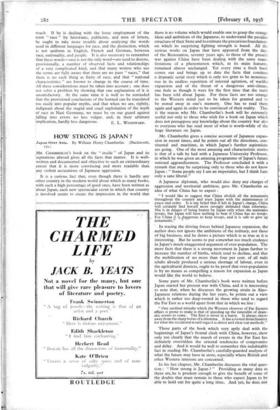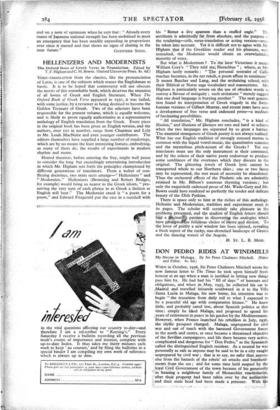HOW STRONG IS JAPAN?
Japan Over Asia. By William Henry Chamberlin. (Duckworth.
' t5s.)
Mn. CHAMBERLIN'S book on the " inside " of Japan and its aspirations abroad gives all the facts that matter. It is well- written and documented and objective to such an extraordinary extent that it is more convincing and more readable than any violent accusations of Japanese aggression.
' It is a curious fact that, even though there is hardly any other country in the modern world about which as many books, with such a high percentage of good ones, have been written as about Japan, each new spectacular event in which that country is involved seems to create the impression in the world that there is no volume which would enable one to grasp the strange ideas and ambitions of the Japanese, to understand the peculiar structure of their State and to estimate the precarious foundations on Which its surprising fighting strength is based. All the serious works on Japan that have appeared from the days
of the Restoration, seventy years ago, to those of the present war against China have been dealing with the same mani- festations of a phenomenon which, in its main features, remained almost unchanged. Yet every time a fresh book comes out and brings up to date the facts that continue a dramatic serial story which is only too grim to be monoton- MIS in its endless repetition of internal agitation, of warlike expansion and of the threat of a dangerous anti-climax, one feels as though it were for the first time that the truth has been told about Japan. For these facts are too strange to the Western mind just to be taken for granted and to
be stored away in one's memory. One has to read them again and again in order to be convinced of their reality. This is the reason why Mr. Chamberlin's book will be extremely useful not only to those who wish for a book on Japan which does not presuppose any knowledge about the country but also to everyone who has read most of what is worth-while of the huge literature on Japan.
Mr. Chamberlin gives a concise account of Japanese expan- sion in recent times, and he points out all the directions, Con- tinental and maritime, in which Japan's further aspirations are going. One of the most amusing and characteristic stories is that of a talk he had with a Japanese University Professor, in which he was given an amazing programme of Japan's future national aggrandisement. The Professor concluded it with a remark that may be surprising only to those who do not know
Japan : " Some people say I am an imperialist, but I think lam only a sane liberal."
A Japanese diplomat, who would also deny any charges of aggression and territorial ambition, gave Mr. Chamberlin an idea of what China has to expect :
"I would like to suggest that China abolish all the armaments throughout the country and trust Japan with the maintenance of peace and order. It is my belief that if left in Japan's charge, China will certainly find herself more strongly defended than otherwise. She is in danger of being beaten by Japan only when she maintains troops but Japan will have nothing to beat if China has no troops. For China it is ,Jpiafgerous to keep troops, and it is safe to give up armaments-."
In tracing the driving forces behind Japanese expansion, the .author does not ignore the ambitions of the military, nor those of big business, and he draws a picture which is as true as it is interesting. But he seems to put somewhat too much credence in Japan's much exaggerated argument of over-population. The mere facts that there is a strong movement in Japan further to increase the number of births, which tend to decline, and that the mobilisation of no more than four per cent, of all mile adults already produced a serious shortage of labour, even in the agricultural districts, ought to be proof that over-population is by no Means as compelling a reason for expansion as Japan would like the world to believe.
Some parts of Mr. Chamberlin's book were written before Japan started her present war with China, and it is interesting to note that, when he discusses the growing strain in Sino- Japanese relations during the last years, he points out a view
which is rather too deep-rooted in those who tend to regard the Far East as a world apart from that in which we live :
"One cardinal mistake which the Western observer of Far Eastern affairs is prone to make is that of speeding up the timetable of dram- atic events to come. The East is never in a hurry. It always sheers away from the sharp horns of a dilemma. It has a rooted disinclination for what the occidental would regard as direct and clear-cut methods."
Those parts of the book which very aptly deal with the beginnings of Japan's frontal clash with China, however, show only too clearly that the march of events in the Far East has definitely overridden the oriental tendencies of compromise and delay. And it would be well to remember this indubitable fact in reading Mr. Chamberlin's carefully-guarded analysis of what the future may have in store, especially where British and other Western interests are concerned.
In his last chapter, Mr. Chamberlin discusses the vital ques- tion: "How strong is Japan ? " Providing as many data as there are, he is prudent enough to give the benefit of some of the doubts that must remain to those who expect Japan to be able to hold oUt for quite a long time. And yet, he does not end on a note of optimism when he says that: " Already.every ounce of Japanese national strength has been mobilised to meet an emergency that has been steadily expanding in proportions ever since it started and that shows no signs of abating in the











































 Previous page
Previous page